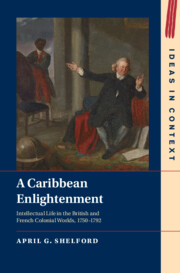Book contents
- A Caribbean Enlightenment
- Ideas in Context
- A Caribbean Enlightenment
- Copyright page
- Dedication
- Contents
- Figures
- Maps
- Tables
- Acknowledgments
- Note on the Text
- Abbreviations
- Chapter 1 What Is a Caribbean Enlightenment?
- Part I Before Breadfruit
- Part II Creating Enlightened Citizens
- Introduction to Part II
- Chapter 4 Making the Affiches, Making Americans
- Chapter 5 American Exceptionalism, Political Economy, and the Postwar Order in the Journal de Saint-Domingue
- Chapter 6 A Slave Named Voltaire; or, Gender and the Making of American Taste
- Conclusion to Part II
- Part III Tristram in the Tropics: or, Reading in Jamaica
- Part IV Cultivating Knowledge
- Bibliography
- Index
Chapter 4 - Making the Affiches, Making Americans
from Part II - Creating Enlightened Citizens
Published online by Cambridge University Press: 14 September 2023
- A Caribbean Enlightenment
- Ideas in Context
- A Caribbean Enlightenment
- Copyright page
- Dedication
- Contents
- Figures
- Maps
- Tables
- Acknowledgments
- Note on the Text
- Abbreviations
- Chapter 1 What Is a Caribbean Enlightenment?
- Part I Before Breadfruit
- Part II Creating Enlightened Citizens
- Introduction to Part II
- Chapter 4 Making the Affiches, Making Americans
- Chapter 5 American Exceptionalism, Political Economy, and the Postwar Order in the Journal de Saint-Domingue
- Chapter 6 A Slave Named Voltaire; or, Gender and the Making of American Taste
- Conclusion to Part II
- Part III Tristram in the Tropics: or, Reading in Jamaica
- Part IV Cultivating Knowledge
- Bibliography
- Index
Summary
Both the Affiches Américaines and the Journal de Saint-Domingue encouraged White male colonists to consider themselves “enlightened” “American” citizens devoted to advancing the public good through reasonable means. This chapter focuses on the Affiches, which flourished into the revolutionary decade of the 1790s. It situates its founding in the rise of similar metropolitan publications while showing how the colonial context informed its objectives. Like metropolitan editors, its founder Jean Monceaux was confident in the power of communication to inform and of discussion to enlighten; brought metropolitan ideas and news into the colonies; created forums for debate within it; and believed that a press served its public by furthering the collective good. Constrained by official censorship, the Affiches nevertheless expressed colonial discontent with the postwar order by publishing extensively on the British Stamp Act Crisis. In the process, it exposed readers to a robust assertion of colonial “rights” in the face of metropolitan “tyranny” and implicitly connected Saint-Domingue’s political troubles with that of British North America and the Brittany Affair in France.
Keywords
- Type
- Chapter
- Information
- A Caribbean EnlightenmentIntellectual Life in the British and French Colonial Worlds, 1750–1792, pp. 108 - 124Publisher: Cambridge University PressPrint publication year: 2023



